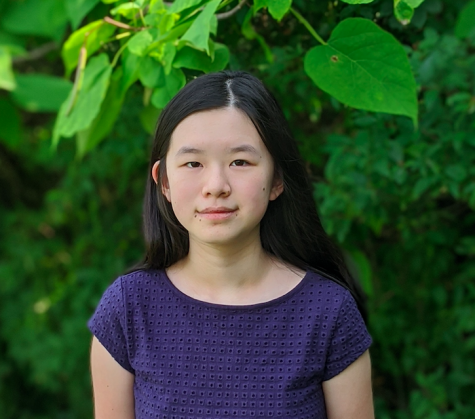A New Stanza
Freshmen discuss the various difficulties and the successes they’ve encountered in their adjustment to high school, especially in a virtual setting.
To many, the atmosphere of high school beats like a pair of butterfly’s wings, always shifting and inconstant. In these four years, many students go through some of their greatest changes as they learn new material in subjects with unfamiliar names, and scramble to find their own place in the grand scheme of things. Of the students at Troy High, many of the students who feel this change the sharpest are the freshmen: new faces in the building who are still trying to get the hang of it all. The onslaught of the pandemic has made this task much harder.
One of the aspects of school life that many feel has taken perhaps the greatest hit from this year’s new online format is the clubs at the school, which many freshmen look towards as a means of finding their place in the THS community.
Freshman Sally Kim said that while she actually doesn’t find high school academics to be that vast of a challenge, trying to stay on top of club news has proven an intimidating task.
“For studying, I think the conditions improved because we can re-watch the lectures and the office hours, but the clubs…because it’s all online, I can’t really get the information,” she said.
Schoology is a platform where students can view their grades and upcoming assignments all in one place, but the clubs often deviate when it comes to their main channel of communication: some have chats on specific apps, others prefer websites, and so on. Due to this, Kim remarks that it feels like she’s constantly out of the loop with what’s going on in Troy High’s extracurriculars.
Within extracurriculars in this extraordinary year, another sore area is sports. Many students participating in athletic events at Troy High are faced with a disheartening reality due to cancellations all across the board, and dates for practices which seem to be continually pushed back further.
“The school sports situation — I really wanted to be part of school sports,” freshman Francesca Giuffrida said. “I had a volleyball season and it got cancelled because of corona. So, they made up some of it just this past November when the school volleyball was going on, so I couldn’t do both, and that was really disappointing because a lot of those girls were from Smith and I went to Boulan, so I really wanted to get to know those people.”
Giuffrida stated that clubs and school sports are where she feels like she belongs at Troy High because of her desire to meet and connect with new people. She said that — regardless of the virus — there’s still the obvious question of whether or not she would have made the volleyball team during try-outs, but what was disappointing to her was that the opportunity to even make an attempt had been taken away from her.
For other students, the recent pandemic has made it difficult to even begin to conceptualize which place in the school feels most like where they belong.
“Because I don’t really know my classmates, I’m not really sure,” Kim said.
To many, one of the greatest effects of the current world situation right now is the pervading sense of loneliness it brings to some of the aspects of life it touches — a natural burden which follows self-isolation everywhere, like how thunder is sure to trail on the heels of lightning. A study done by the Department of Behavioural Science and Health in London reported that in terms of experiencing loneliness during this time, “…being a student emerged as a higher risk factor during lockdown than usual.”
For freshmen, many believe the best way to potentially fight this sense of loneliness and feel truly at home in this new environment is for them to know and become familiar with fellow students — but that’s yet another thing which has been taken away by quarantine. Giuffrida expressed that it has definitely become more difficult to connect with peers, but that part of it is also the people themselves being unwilling to be fully open during a stressful time.
“[It] kind of depends on whether [the classmates] want to participate or not,” Giuffrida said. “A lot of my teachers put us into breakout rooms, and a lot of them would just make us say, ‘Hi, how are you?’ and talk about your own personal life…and if [the classmates] would participate, then yes, I’ve met new people, but if they wouldn’t, then it’s really hard…and a lot of times I am the person to just unmute and be like, ‘Okay guys, what’s up?’”
Giuffrida said that she believes her classmates have gotten to know her better because of her willingness to be active in the discussion, but she doesn’t feel as though she’s gotten to know her classmates better.
Kim stated that she has still been making an effort to socialize with her classmates.
“Not as much I would’ve in school,” she said, “but Zoom, if you actually try to talk to people, it actually works.”
Kim also expressed that although in a virtual classroom people are in their own house and are free to do almost anything they want in-between classes, the Zoom classroom is — in some ways — more rigid than the in-person classroom. Distanced by a shut-off camera and a microphone icon with a permanent slash through it, what is conspicuously missing to many students from this new learning environment are the little tidbits of conversation that they once considered integral to the in-person classroom experience. Most students know about arriving a few minutes early to their next class to buy themselves some precious time to chat quickly with friends before the start of the lesson, and of course, about the lighthearted words exchanged in the hallways during passing time.
Kim said that the Zoom classroom does not allow these little conversational gestures to really flourish — at the end of a lesson, students sign off, and that’s that.
And do freshmen even feel connected to the Troy High community to begin with?
“Can I be honest? No,” Kim said.
She expressed that while she does feel a degree of connection with the teachers, the students are another matter — with her classmates often having their cameras off, going to class amidst a sea of empty black squares contributed deeply to a feeling of disconnection.
“It really depends,” Giuffrida said. “Like, my bio teacher, she always checks in, makes sure our mental health is okay, and I feel connected to her because I feel comfortable talking to her.”
Giuffrida stated that during her volleyball practices on the field, she felt connected to the coaches, who she said did everything they could to try and make sure that people were able to get their needed amount of practice in. It eased her disappointment with this year’s volleyball season, as the practices still allowed her to play and meet with other students.
Many students moving on from middle school view high school with a kind of inspired fear — to many of them, it’s the intimidating and fantastical new chapter unfolding in their lives. For a myriad of freshmen this year, it can be certain that this virtual environment has made almost everything all new: from the way they reach out to their teachers and classmates, to the environments that they take their assessments in, to the new kinds of distractions which hinder attention in class. For many, high school is a new body of lines in a poem, a new stanza which breaks off from all else. It waits for freshmen to write it together — this year, more than ever.
Your donation will support the student journalists of Troy High School - MI. Your contribution will allow us to print our work, purchase equipment and cover our annual website hosting costs.


